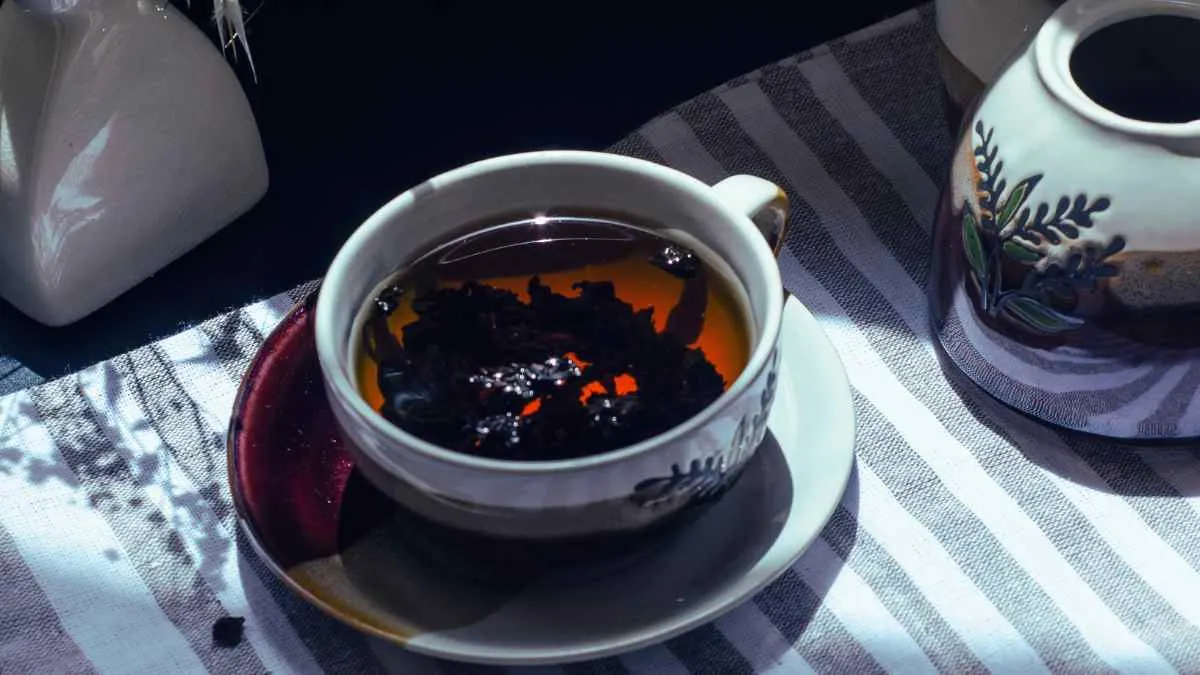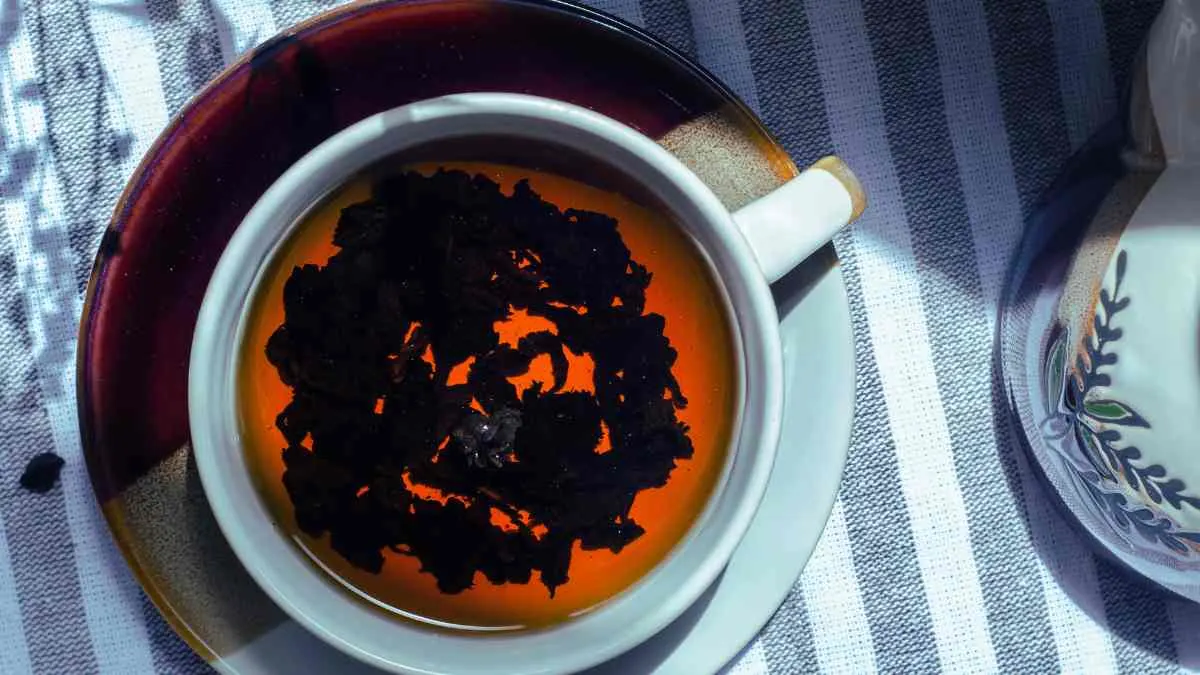Oolong tea is a traditional Chinese tea that falls between green tea and black tea in terms of oxidation. It is made from the leaves of the Camellia sinensis plant and is partially fermented, giving it a unique flavor profile that is floral, fruity, or even toasty.
Oolong tea is packed with antioxidants, can boost metabolism, improve heart health, and support weight management. It has a moderate caffeine content and can be enjoyed hot or cold.
What is Oolong Tea?
Oolong tea is derived from the Camellia sinensis plant, the same plant used to make green, black, and white teas. However, the key difference lies in the processing method. Oolong tea undergoes a process of partial oxidation, which is typically between 10% and 80%. This partial oxidation gives oolong tea its distinctive taste, which is often described as a blend of the fresh, grassy notes of green tea and the deep, robust flavors of black tea.
The process of making oolong tea begins with the leaves being plucked, then withering them in the sun, followed by a brief period of oxidation. The leaves are then rolled or twisted to break down their cell walls, which allows for the release of essential oils and enzymes. Finally, the tea is dried to stop the oxidation process, resulting in the characteristic oolong tea flavor.
5 Types of Oolong Tea:
Oolong tea comes in various types, each with its own unique flavor profile, which depends on the region where it is grown and the specific processing methods used. Here are some popular varieties of oolong tea:
1. Tie Guan Yin (Iron Goddess of Mercy):
Tie Guan Yin is one of the most famous oolong teas, originating from the Fujian province in China. It is known for its floral fragrance and smooth, mellow taste. It is often described as having a balance of sweetness and a light, orchid-like aroma.
2. Da Hong Pao (Big Red Robe):
Da Hong Pao is a highly prized oolong tea from the Wuyi Mountains in China. It is known for its bold, roasted flavor with hints of chocolate, honey, and a slightly smoky aftertaste. Da Hong Pao is one of the most expensive teas in the world, often reserved for special occasions.
3. Wuyi Rock Oolong:
Grown in the rocky terrain of the Wuyi Mountains, Wuyi Rock Oolong has a robust flavor profile with strong mineral notes. It is known for its complex taste, with hints of honey, nuts, and a slight roasted flavor. This tea is often aged to develop a deeper flavor.
4. Milk Oolong:
Known for its creamy, smooth texture, Milk Oolong is a popular Taiwanese tea with a naturally sweet flavor. The tea is often described as having a buttery taste, with a slight milky or caramelized finish. It is usually enjoyed for its rich flavor and smooth mouthfeel.
5. High Mountain Oolong:
Grown in the high-altitude regions of Taiwan, High Mountain Oolong is known for its fresh, floral fragrance and light, sweet taste. The high altitude contributes to the tea’s mild flavor and smooth texture, making it one of the most sought-after oolongs.
Health Benefits of Oolong Tea:
Oolong tea is not only a flavorful beverage but also offers numerous health benefits. Here are some of the key health advantages supported by scientific research:
1. Rich in Antioxidants:
Oolong tea contains high levels of antioxidants, particularly polyphenols like catechins and theaflavins, which help neutralize free radicals in the body. Free radicals can cause oxidative stress, leading to cell damage and increased risk of chronic diseases such as heart disease, cancer, and aging.
According to Dr. Josh Axe, a leading expert in nutrition and wellness, antioxidants found in oolong tea can help protect the body from this damage.
2. Supports Weight Loss:
Drinking oolong tea regularly has been linked to weight loss and improved fat metabolism. Research published in the European Journal of Clinical Nutrition found that the polyphenols in oolong tea can increase fat oxidation and promote weight loss, particularly in individuals with higher body fat levels.
Oolong tea’s ability to improve metabolism and reduce fat accumulation makes it a great choice for those looking to manage their weight.
3. Improves Heart Health:
Studies suggest that oolong tea may help lower blood pressure and reduce cholesterol levels, both of which are important for maintaining a healthy heart.
A study in the Journal of Ethnopharmacology found that drinking oolong tea regularly could help reduce the risk of cardiovascular disease by improving lipid profiles and blood vessel function.
4. Enhances Mental Clarity:
Oolong tea contains caffeine, which can improve mental clarity, focus, and alertness. However, unlike coffee, the caffeine in oolong tea is released gradually, providing a more sustained energy boost without the jitters.
Dr. Michael Apolito, a well-known nutritionist, states that oolong tea’s moderate caffeine content combined with L-theanine, an amino acid found in tea, promotes calm alertness and mental clarity.
5. Promotes Healthy Skin:
The antioxidants in oolong tea may also contribute to healthy, glowing skin. Oolong tea has anti-inflammatory properties that can reduce the risk of skin conditions like eczema and acne.
The polyphenols in oolong tea have been shown to protect the skin from harmful UV rays, preventing premature aging and wrinkles.
Read Next: Why Matcha Tea | Benefits, Recipes, and Tips
How to Brew Oolong Tea:

Brewing the perfect cup of oolong tea requires careful attention to water temperature and steeping time. Here’s how you can brew oolong tea to bring out its best flavor:
Ingredients:
-
1 teaspoon of loose-leaf oolong tea (or one tea bag)
-
8 ounces of water (heated to 190°F-200°F, just below boiling)
-
Optional: Honey or lemon for added flavor
Instructions:
-
Boil water and let it cool slightly to about 190°F-200°F.
-
Place the tea leaves in a teapot or infuser.
-
Pour the hot water over the tea leaves.
-
Let it steep for 3-5 minutes, depending on how strong you like your tea.
-
Strain the leaves and serve. You can add honey or lemon if desired.
FAQs:
Q. Does oolong tea contain caffeine?
Yes, oolong tea contains caffeine, though less than coffee. A typical cup of oolong tea contains around 30-50 milligrams of caffeine, depending on the brewing time.
Q. Is oolong tea good for weight loss?
Yes, oolong tea can help promote weight loss by increasing fat oxidation and metabolism, making it a great addition to a weight management plan.
Q. What does oolong tea taste like?
Oolong tea has a flavor profile that varies depending on the type, but it generally has floral, fruity, or even toasty notes. It’s a balance between the lightness of green tea and the robustness of black tea.
Q. Can I drink oolong tea every day?
Yes, you can drink oolong tea every day. However, since it contains caffeine, it’s advisable to consume it in moderation, especially if you’re sensitive to caffeine.
Q. Can oolong tea be served iced?
Yes, oolong tea can be served iced, making it a refreshing drink in warm weather. Simply brew the tea, let it cool, and serve it over ice.

